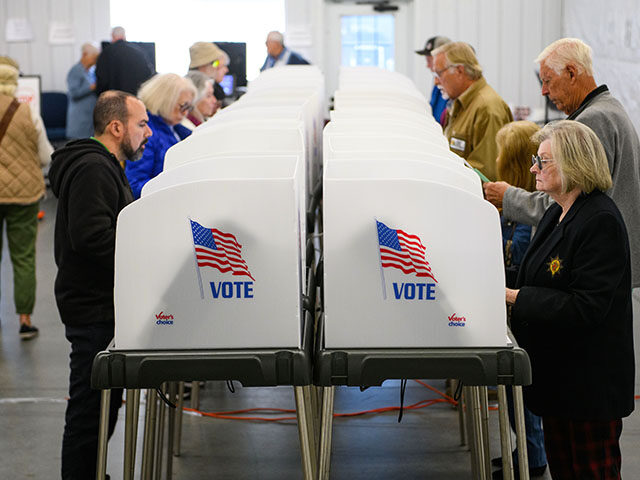Boyle: 2024 Election Comes Down to the Wire — Which America Will Turn Out on Tuesday?

According to the polling data and voting results that are coming in from various places, 2024 is going to be a close race. Some people make predictions, claiming to have an insight into whether or not former President Donald Trump can pull off the biggest comeback in American history, or if Vice President Kamala Harris is going to pull off a historic victory following her late entry into the race after her boss, President Joe Biden dropped out.
All that matters is who votes, what party mobilizes their supporters, and which case theory is correct. I won’t make any predictions because I believe they are pointless. What I’ll do is explain what I have been analyzing in the last two weeks, and what I will continue to analyze in the next two days. We will know on Tuesday evening which theory is right.
In the run-up to an upcoming election, I am asked by almost everyone what I believe will happen. Everyone who knows me, whether they are in the news business or just tuning in during the last days of the election, knows that this isn’t my first time covering presidential elections. This is my fourth time working in the media and my third at Breitbart. I have also covered many midterms and special elections. People know that I am obsessed with data from polls, voting patterns and other sources to try and predict demographic changes or swings. I would argue that my track record is good when it comes spotting things others missed, most notably the 2016 election but also important stuff in 2014 and 2020, 2021, or 2022. I am also in constant communication with people on both sides trying to understand headwinds. I talk to campaign staffers and other outside groups and have an overall good idea where to find reliable information.
I’m not a fan of either party’s happy talk, but I do try to explain what will happen in a logical way rather than giving slanted or biased views. As soon as election night is over, the reality will kick in. Someone has to win and someone else has to lose. After 2016 and 2020, when the polling industry missed major elections by a wide margin, I am always asked if it will happen again. It’s possible, but not certain until the votes have been counted. What I will do is something different from what I usually do when I cover news. As I see the world now, and as I am expecting and looking for, to determine whose theory is correct, I will lay out the landscape. And yes, you have probably noticed that I use the first person, which is unusual for me. Please, I ask readers and observers to hold me accountable when the election results are in. Although I don’t make predictions on the outcome of the election, I do want Trump to win. I have said this publicly and told former President Obama when I interviewed him mid-October that I would be voting for him. I see a very clear path for him to follow. There’s also an equally strong case for the opposite. I don’t like hedgers, but I am doing that here, because there are many signs that are positive. No one can predict the future, but anyone who says they can is wrong. As far as I am concerned, humans do not possess this superpower.
|
The landscape on the final weekend:
Let’s start by describing the current state of the race, as we begin Sunday morning, two days before the election. The establishment media was giddy on Saturday night when they praised a poll conducted by Ann Selzer, the respected pollster for the Des Moines Register, who is revered as an oracle by the political elite. It showed Harris ahead of Trump by just 3 percent in Iowa. The Emerson College Iowa poll, released earlier that evening, showed Trump leading by double digits and exceeding his 2020 victory margins against Biden. This raises an interesting question. Which is correct? Nate Silver wrote in his column on Saturday night that both things are unlikely to be true, except at the extremes of the margins of error of the two surveys.
Many people, who are really, really intelligent and who understand Iowa politics very well, think that Selzer missed the target.
AtlasIntel released national and battleground polls shortly after Selzer’s Iowa poll. Atlas polls indicate that Trump leads in every battleground state.
Atlas has also pushed Trump to the national level.
Two worldviews that are radically different, right? Atlas didn’t poll Iowa but if Selzer’s theory is true, Atlas’s theory cannot be correct. Many people have pointed out correctly that if Trump is struggling in Iowa, then he is likely in trouble in Wisconsin, where he is not leading by much more than one percent.
On Sunday morning, more polls came out. Emerson College’s national survey indicates that Trump and Harris are tied at 49 percent.
This would likely mean that Trump will sweep the battleground states in the electoral college or something close to that. In 2016, Hillary Clinton, a Democrat, won the popular vote nationally by over two-and-ahalf points but lost in the electoral colleges. And in 2020 Biden took the popular vote national by more four and a quarter points and won by a slim margin the electoral colleges. These aren’t the only national surveys released on Sunday morning. NBC News published a poll that showed Trump ahead by 1% over Harris with all candidates, including third-party candidates. The two were tied in head-to-head.
The polls of the last few weeks show similar differences, some large and some minor, but sufficient to make a difference. The question is, how do you make sense of this data deluge? Silver’s headline in the Selzer Poll release states that “someone is going to make a mistake.” The question is, who will be making a mistake and why? The Trump team believes that the same people in the political establishment – the media, pundits and pollsters – will be wrong this time around. They have good reasons to believe this. It’s possible that the opposite is true. In a few days, we’ll know which case is right and which is wrong. Here’s an article explaining what data we have available to the public and why it’s reasonable to think that Tr








No Comments